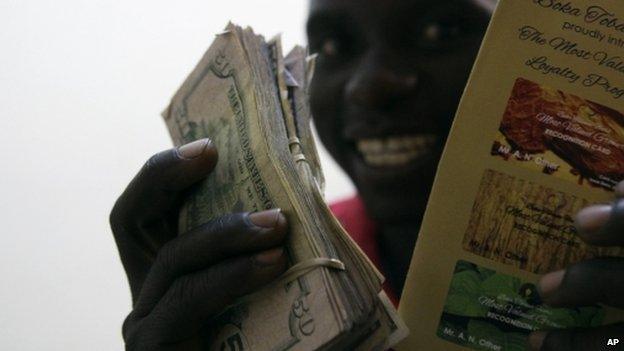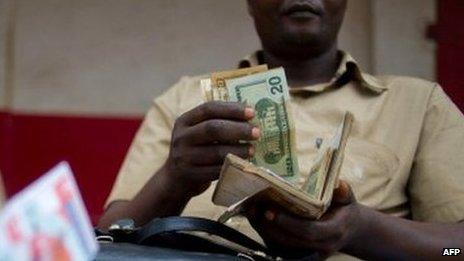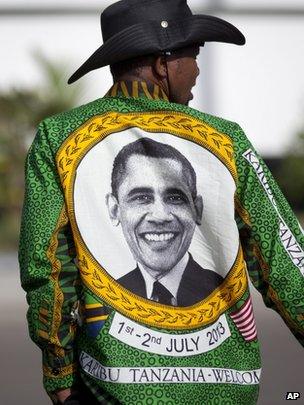Letter from Africa: Dollar dominion
- Published
- comments

In our series of letters from African journalists, Zimbabwean film-maker and columnist Farai Sevenzo considers spending power and the ongoing battle for Africa's resources.
Barack Obama declared in Dakar, Senegal, external - on the occasion of his second coming to sub-Saharan Africa as US president - that he was "in Africa… because Africa is rising and it is in the United States interests… that the United States don't miss the opportunity to deepen and broaden the partnerships and potential here".
We have been told for a handful of years now of our potential as oil is found off the Ghanaian coast, as gas seeps out in Tanzania while minerals of every hue come bubbling forth from the bowels of the Earth, from Algeria to Zimbabwe.
And like a recklessly wealthy bride, we look over our shoulders at the orderly queue of suitors seeking a partnership of one kind or another.
A quick glimpse of the expanding urban landscapes in Luanda or Lilongwe via Google Earth may tell the president that China, the other great power, has been deepening and broadening partnerships for a little longer and that he needs to hurry up and catch up.
For while Africa will always open her arms to him as a grandson, the Chinese have been putting money in roads, hospitals, universities, football stadiums, chicken farms and oil drilling for so long the only American thing we may have left is Coca-Cola and the movies on satellite television.
Still, try he must.
In my travels, though, I have marvelled at the reach of the American dollar as the currency of choice in Luanda, in Somaliland, in Harare.
In these places America's dollars are exchanged in the markets to for a bunch of tomatoes, in the shadier parts of the cities for drugs or diamonds or hostages.
'God of riches'
The dollar bill has a longevity all of its own as it passes from hand to hand, shoe to shoe, bra to bra, back to the telephone airtime seller and onto the sugar cane seller and through a beer-soaked bar and back to your wallet as change.

The busily traded US dollars often become filthy in Africa
The dark barely legible note disintegrates and dies a natural death in a thunderstorm or heatwave until the next notes emerge crisp and new from another traveller or a cash machine thanks to America's printing presses and mint thousands of miles away from Africa's hustle-bustle commerce.
In Harare with my teenage children the other week for a long over-due trip to their grandparents, Mr Obama's currency was everywhere, the city having abandoned its own kamikaze trillion dollar notes for the relative stability of the greenback.
I am not sure whether it is the US dollar or the Chinese shops that have lent the city an air of over-spilling wealth.
Harare is gridlocked with vehicles of every make, and dusty courtyards are packed with second-hand vehicles from as far afield as Beijing while old potholed roads compete with new smooth ones under construction and out to tender for thousands of $100 bills - so-called "Benjamins".
In the mushrooming churches the preachers ask for cash offerings and appeal to the congregations to help raise $10,000 for a special church project. For the faithful gather every Sunday and proclaim their God is a God of prosperity and riches and not of poverty.
And so the pastor asks the congregation to raise their dollars to the sky and ignore the devil and to pray that their dollars may become numerous like the proverbial loaves of bread.
Moral high ground
Everywhere you look, Mr Obama's money is wanted and being raised to the skies, but his business folk are thin on the ground.

The US trails behind China when it comes to trade in Tanzania
In the mining outposts and the more affluent vegetable markets with names like Honeydew Farm, the Africans shop with the Chinese and the Iranians and the Russians for goods in exchange for US dollars.
Over in Nairobi - not on the president's itinerary - the ladies at duty free complain that my dollar bills (the few remaining in my wallet from Harare) are filthier than their Kenyan shillings and I realise the truth of America's search for African markets. It is regarded as clean currency, a bill of democratic health.
In Nairobi where the new President Uhuru Kenyatta would make an inconvenient photo op with Mr Obama, given the ICC indictment, the Chinese are shopping with their crisp US bills.
Over in Benghazi and Cairo, new governments established with America's assistance are in a tail spin of doubt confusion and violence while the Chinese turn a blind eye to the great issues of governance and democracy, say little of the ICC, do business with indicted leaders in Kenya and Sudan, have their premiers visit Africa every year for the last decade, host a China-Africa summit on a regular basis, and forever chase our resources.
The moral high ground has been Mr Obama's, but his dollars have long resided in Chinese wallets.
And so, it was fascinating to read between the president's lines as he spoke in Pretoria, external: "Somebody says they want to come build something here, are they hiring African workers?
"Somebody says … we want to help you develop your natural resources - how much of the money is staying in Africa?
"I do think it's important for Africans to make sure these interactions are good for Africa."
And then the big announcement - President Obama will host a summit of leaders from across sub-Saharan Africa in 2014.
The guest list alone should be more interesting than the dinner menu.
It is high noon on the African plains; will the gunfight for African trade between these two super powers result in a hail of bullion and yet more dollars for those caught in the cross fire?
If you would like to comment on Farai Sevenzo's column, please do so below.
- Published18 June 2013
- Published26 June 2013